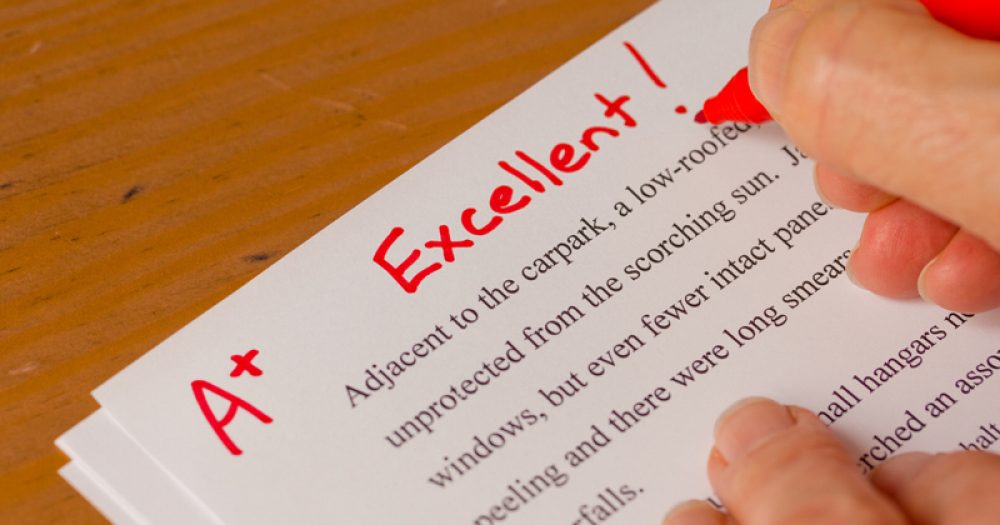As part of the Department for Education (DfE) Workload Challenge, I was commissioned by Tarporley High School and Sixth Form college in Cheshire to study the effects of teachers not marking school work.
Two reports published in 2016 (the DfE’s Reducing Teacher Workload: Marking Policy Review Group Report and the Education Endowment Fund’s Evidence on Marking: A Marked Improvement?) helped to create an environment that allowed schools to question more freely the purposes and uses of written marking. This was supported by myth-busting statements by Ofsted that year that “inspectors should not report on marking practice, or make judgments on it, other than whether it follows the school’s assessment policy.” So Tarporley’s Ffion Eaton and Jason Lowe decided to do something bold and find out what would happen if teachers set aside the red pens.
What did we do?
Between March 7, 2017 and May 26, 2017 we conducted a small randomised controlled trial, the “Re-Balancing Feedback” trial, which involved 30 teachers’ Year 10 and Year 12 classes studying English and English Literature at GCSE and A-level in three secondary schools in Cheshire: Queen’s Park High School; Tarporley High School and Helsby High School.
The trial was designed to ascertain the impact of an intervention designed to reduce marking on teacher workload and student attainment. Teachers in the intervention group read everything students wrote but stopped marking books and then used a series of planned class-based feedback strategies called “Front-End Feedback”, “Register Feedback” and “Strategic Sampling”. The control group teachers continued to do marking as usual.
What did we learn?
Listening to teachers who stopped marking was a fascinating experience for me. Comments like, “I sit down and do a couple more hours planning or do a couple more hours research [which] makes it more pleasurable” were predictable; less so were the ones that pointed towards a sense of guilt, which was quite a common refrain. One teacher said that “there is that sense of anxiety I am short-changing them.” Interestingly, some reported that they were using the reclaimed hours to do more marking of their Year 11 and Year 13 students’ books.
The feelings of students whose work was no longer being marked were very clear. One told me that she preferred her work “to be marked, acknowledged and know that I am on the right track doing it;” others highlighted their belief that marking was very much a core part of a teacher’s job. Students also voiced annoyance at having to think more about their work under the new feedback system; we found the use of visualisers in class to give live feedback on students’ work seemed to motivate greater attention to detail.
Listening to teachers who stopped marking was fascinating
The impact on student attainment outcomes was unsurprising. While there are limitations to the findings of such a small trial, the results indicated that there was no detectable impact of the new “rebalancing feedback” approach on blind-marked, moderated past-paper exam questions: outcomes on average for the intervention and control group students were broadly similar. Teacher workload, however, was a different story, with most teachers reporting reductions in overall workload.
What happened after the trial?
The students in the trial have successfully taken their GCSEs and A-levels respectively, and Tarporley High School has rolled out a new whole-school Feedback Policy, which is:
No expectation for written comments or codes
No expectation to do acknowledgement marking i.e. “ticking pages”
No expectation to evidence verbal feedback through stamps/codes
The expectation that most lessons will include some form of feedback
I’m sure that, as with anything apparently “simple”, the implementation of the policy has been challenging. But the thing I like most about the policy statements is the use of the word “expectation”. “No expectation of written comments” gives, I hope, an individual teacher the responsibility to make a justified decision that is both efficient and effective for them and their students.
Reference: Kime, S. (2018). Reducing Teacher Workload: The “Re-balancing Feedback” Trial. DfE. London.








The best ‘feedback’ of all is to review a quiz or to use closed questions to ensure that each vital element of a complex topic is understood. It’s all in Rosenshine.
My son’s taking 4 A Levels. In two of those subjects, Physics & Maths, the teachers mark no/very little schoolwork themselves. He’s gone from being an A & A* performer in those subjects at GCSE to getting C in the class tests (which are marked by the teachers) in his first A level year. Shortly before lockdown, I got a maths tutor for him because my son said he was struggling so badly in maths. The tutor confirmed his understanding of key topics was poor
During lockdown, my son did no Physics at all as the teacher wasn’t marking any of the work or asking for anything to be submitted to him. My son sees all the teachers who adopt no-marking policies as lazy. Teachers are role models for young people, & these teachers provide poor role models, regardless of their rationale. Students’ expectations & needs are really important, & they’re being overlooked with the no-marking model.
Can we have the schools’ marking policy in full?